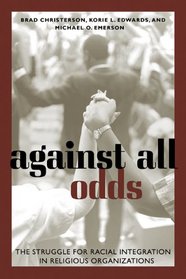Search -
Against All Odds: The Struggle for Racial Integration in Religious Organizations
Against All Odds The Struggle for Racial Integration in Religious Organizations
Author:
View the Table of Contents. — Read the Chapter One. "Breaks new ground by offering us a much better understanding of the operation of both religious congregations and race relations in the U.S. The research is impressive, the analysis smart, and the insights and implications important. This is a unique and significant book." — ?Chris... more »
Author:
View the Table of Contents. — Read the Chapter One. "Breaks new ground by offering us a much better understanding of the operation of both religious congregations and race relations in the U.S. The research is impressive, the analysis smart, and the insights and implications important. This is a unique and significant book." — ?Chris... more »
ISBN-13: 9780814722237
ISBN-10: 0814722237
Publication Date: 1/1/2005
Pages: 207
Rating: ?
ISBN-10: 0814722237
Publication Date: 1/1/2005
Pages: 207
Rating: ?
0 stars, based on 0 rating
Publisher: NYU Press
Book Type: Hardcover
Other Versions: Paperback
Members Wishing: 1
Reviews: Amazon | Write a Review
Book Type: Hardcover
Other Versions: Paperback
Members Wishing: 1
Reviews: Amazon | Write a Review
Genres:
- Religion & Spirituality >> General
- Nonfiction >> Social Sciences >> Discrimination & Racism
- Nonfiction >> Social Sciences >> Sociology >> Race Relations >> America
- Nonfiction >> Social Sciences >> Cultural & Ethnic Studies
- Christian Books & Bibles >> Christian Living >> Faith
- Christian Books & Bibles >> Church History >> General
- Christian Books & Bibles >> Churches & Church Leadership >> Church Institutions & Organizations




